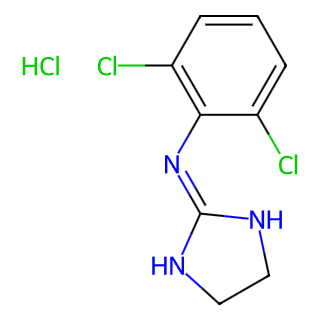- Synthetic anti-infective drugs
- Medications for the digestive system
- Antipyretic and analgesic drugs
- Medications for the blood system
- Medications for the respiratory system
- Anti-allergic drugs
- Medications for the urinary system
- Diagnostic medications
- Immunosuppressive and immunomodulatory drugs
- Vitamins and mineral supplements
- Antioxidants and medications for osteoporosis
- Antiparasitic drugs
- Ophthalmic medications
- Amino acids and their derivatives
- Dermatological medications
- Medications for the circulatory system
- Antitumor drugs
- Medications for the nervous system
- Hormonal and endocrine function-regulating drugs
- Antibiotics
- Others
CAS NO.: 4205-91-8




Clonidine hydrochloride, also known as Catapres, is a significant pharmaceutical compound primarily used for the treatment of hypertension and as an aid in smoking cessation and opioid detoxification. Below is a detailed introduction to its information:
Basic Information
CAS Number: 4205-91-8
English Name: Clonidine Hydrochloride
Chinese Name: Yansuan Keleding
Synonyms: Clonidine HCl, Catapres, 2-(2,6-Dichloroanilino)-2-imidazoline hydrochloride, [2-(2,6-Dichlorophenyl)imino]imidazolidine hydrochloride, etc.
Molecular Formula: C9H10Cl3N3
Molecular Weight: 266.555
Physical and Chemical Properties
Boiling Point: 319.3ºC at 760 mmHg
Melting Point: 312 °C
Flash Point: 146.9ºC
Stability: Stable under normal temperature and pressure
Solubility: Soluble in water and ethanol, practically insoluble in chloroform and ether. Water solubility: 50 mg/mL, clear, colorless
Pharmacological Effects
Clonidine hydrochloride is an agonist of α2-adrenoceptors with the following pharmacological actions:
Antihypertensive Effect: It directly stimulates α2 receptors in the hypothalamus and medulla oblongata, activating inhibitory neurons and reducing the output of central sympathetic impulses. This, in turn, inhibits peripheral sympathetic activity. Additionally, it stimulates presynaptic α2 receptors in the peripheral sympathetic nerves, enhancing their negative feedback mechanism and reducing the release of norepinephrine from nerve terminals, thereby lowering peripheral and renal vascular resistance, slowing heart rate, and decreasing blood pressure.
Other Effects: Clonidine hydrochloride has potential in treating migraine, dysmenorrhea, and hot flashes during menopause, possibly through stabilizing peripheral blood vessels. It may also aid in opioid addiction treatment by inhibiting central α-receptor activity.
Storage and Transportation
Storage Conditions: Store in a well-ventilated and dry place, protected from light, and sealed. The recommended storage temperature is 2-8°C.
Transportation Conditions: Ice packs may be required during transportation to ensure stability.
Clinical Applications
Clonidine hydrochloride is clinically used primarily for the treatment of hypertension and as an adjunct in smoking cessation and opioid detoxification.

Tai Yau Street, San Po Kong, Kowloon, Hong Kong, China.



